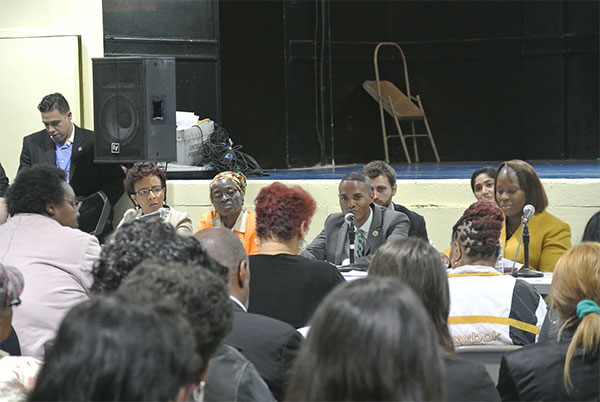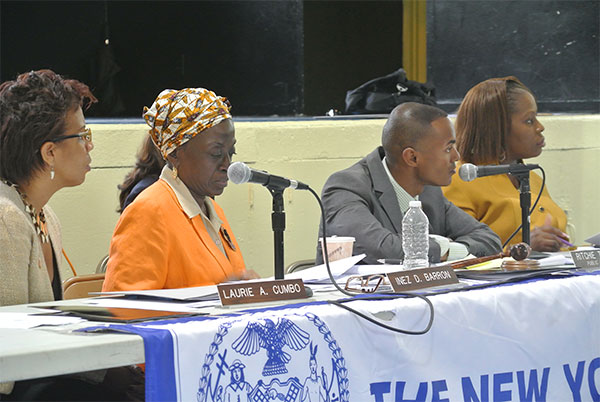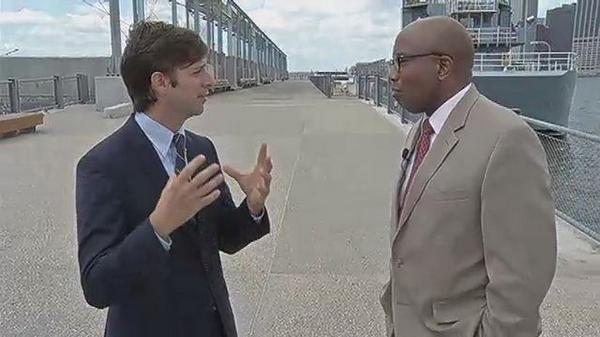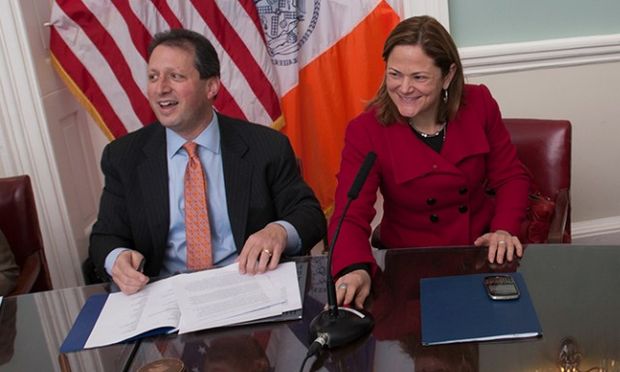
An image of One Riverside Park via Extell Development Company
With the "poor door" controversy, the de Blasio administration faces one of its biggest housing and equity challenges. And it has only just begun.
***
As part of the Riverside South development project, 40 Riverside — a massive mixed-unit condo on Manhattan's rapidly developing West Side — will include 274 units and rise 33 stories. The complex's taller tower has 219 market-rate condo units inside and looks out at Riverside Boulevard and the gleaming Hudson, while the shorter tower has 55 permanently affordable units and faces West 63rd Street. This dichotomy is why a year and a half ago, 40 Riverside made front page news.
The developer, Extell Development Company, was chastised by many for creating a Darwinian-named structure otherwise known as a "poor door," the now common-place term for the separate entrance of the shorter tower and its lower-income tenants. And, for critics' sake, the contrast between the two entranceways, a pedestrian one for affordable housing tenants around the block from the more glamorous main lobby, offers concrete fodder for ongoing appall.
In July of this year, the administration of Mayor Bill de Blasio begrudgingly signed off on Extell's application for the Inclusionary Housing Program, the initiative through which the "poor door" came about. In effect, a mayor who was elected railing against the "tale of two cities" New York's socioeconomic disparities had wrought, allowed a striking physical symbol of the divide to be erected. With terms like "segregation" and "apartheid" being lobbed, the move had de Blasio supporters up in arms: liberal betrayal by the mayor on wealth and housing.
But that's not to say that the mayor hasn't been working within the legal framework he inherited from his predecessor - he has - and now he has to deal with the blowback as "poor door" fervor grows, even as his administration and elected officials seek alternatives to or ways to mitigate a law that remains in effect.
From the looks of the real estate projects in the city's pipeline, though, the "poor door" controversy won't be exiting the public discourse anytime soon: a source at the city's Department of Housing Preservation and Development (HPD) said there are at least 3 Riverside-like developments that are due up for approval in the coming months. Each of them ask for the same things: a segmented building, separate entrances, and a 421a (affordable housing) tax abatement. And, given the legal framework, it seems the administration will eventually have to approve them, "poor door" and all.
Now, the de Blasio administration and local elected officials in areas where "poor door" complexes may be built are moving to mitigate the social and public relations effects that could come with their arrival.
* * *
The "poor door" story begs the question: how did such a blatant loophole in zoning code become legal at all?
In 2009, a legal text amendment to the Inclusionary Housing Program added what are known as "segmentations" to the initiative's original basis, which was to let developers expand their buildings by upwards of 20 percent (and, therefore, increase their profits) if at least 20 percent of the units were dedicated to affordable housing. Created in 1987, the idea of the program was that rapidly developing and more expensive neighborhoods — in this case the Upper West Side — were inaccessible to lower-income residents, so by incentivizing developers to build these mixed-unit apartment buildings through providing valuable air rights and tax exemptions, the demographics could diversify and, in theory, produce a stronger local community.
In order to qualify for the program, developers had to build the affordable housing either on-site, off-site, or within the Community Board district. But now, under the umbrella of "off-site," they had the option of nearby segmentations, an addition to the law the City hoped would spark more development that included affordable housing by making it easier to build. This allowed developments to be divided into two parts — one for affordable units; the other for market-rate — whether physically connected or not, and legally valid under the program. Each part of a segmented building requires, by law, its own entrance, thus creating the "poor door."
So, to the frustration of many housing advocates and politicians, what Extell proposed for 40 Riverside was entirely codified and legal. And, instead of taking the gift of a floor area expansion the housing program offers, Extell is allowed, by zoning law, to make use of this space by selling it to other developers if they build within the same district or at least a half a mile away. And that's exactly what the development company plans to do. In other words: maximizing profit instead of offering more space.
"That's why I'm calling it a loophole," said City Council Member Helen Rosenthal, who represents the area where 40 Riverside is being built. On this note, Rosenthal argued that Extell "knows how to work the system to their advantage." This is the same Extell, of course, that had received tax breaks from Albany for its Park Avenue condo, ONE57, soon after Extell President Gary Barnett donated $100,000 to Gov. Andrew Cuomo. The exchange became a subject of the Moreland Commission subpoena scandal that rocked the governor's office this past summer.
Adding further to the prickly politics of the whole thing is the approval process, which, for the most part, is shielded from the public. In a normal procedure, a development is pitched to the relevant Community Board and its specific land use committee, which then review it and send it up to City Planning for approval, thereby issuing a Land Use Review, to be finally voted on by the City Council. For this, there are numerous outlets by which members of the public can provide feedback should they disagree (or agree) with the idea of looming condos or any other aspect of a proposed development in their neighborhood.
But with the Inclusionary Housing Program, things work a bit differently. Negotiations of interests and demands are made between City Hall's Department of Housing Preservation and Development (HPD), and the developer itself. In doing so, the developer must send a copy of the application to the Community Board in the relevant district, just to make them aware of the situation. In that step, some details can be conveniently left at the bottom.
In a letter to Mark Diller, then-chair of Community Board 7, a lawyer for Extell summarized 40 Riverside's blueprint and the company's plan to sell the extra floor area. Attached and signed by Extell's Barnett was the application that was sent to HPD, which states that the building is part of the Inclusionary Housing Program. However, there is no mention whatsoever — in the letter or the application — of the segment or its separate entrance until the last page.
"Would you rather not have the affordable housing? Ask any one of the thousands of people who are applying for that, and they don't give a damn," Barnett said on NPR in July. "They want to have a beautiful apartment, in a beautiful neighborhood, and you know, at a super price."
Requests to speak with a representative from Extell for this article have been made, but no one has been made available to Gotham Gazette.
June of 2013 — when the "poor door" first made airwaves — was, of course, a different time, with a different mayor occupying City Hall; widening income inequality was a topic of plenty of campaign conversation, but not quite yet the main target of the city's commander-in-chief. Hence why, even amid critical headlines, the plan passed seamlessly through Mayor Bloomberg's office. By the time Mayor de Blasio took office in January, at least six floors of 40 Riverside had already been built, and other developers were lining up their segmented development plans.
* * *
In May, Mayor de Blasio formally announced his ten-year plan to create or maintain 200,000 units of affordable housing across the big city — a blueprint that, in the vein of former mayor and de Blasio hero Fiorello LaGuardia, he deemed "the largest, most ambitious housing plan ever." For it, he promised to "drive a hard bargain" with developers for housing that was fair and equitable; a clear cut from his predecessor, who was one of the most development-friendly mayors in New York City history. And then, just two months later, 40 Riverside made its way back into headlines.
"The next step now is, 'How do we fix it?'" Council Member Rosenthal said.
At the beginning of each mayor's tenure, the administration conducts assessments of ongoing programming to ensure alignment with the new mayor's vision and ideology. According to a source at HPD, this is currently being done regarding affordable housing with the Inclusionary Housing Program. De Blasio's office is seeking to streamline and improve upon the technicalities and language that exist in order to best serve the priorities of the administration, which include expanded affordable housing provisions and, generally speaking, equity.
In an August letter to City Hall, Manhattan Borough President Gale Brewer criticized the loophole for "creating second-class citizens" and asked City Hall to perform a renovation of the 2009 zoning amendment that does not include the "two-door option."
In order to do so, a spokesperson for Brewer described the necessary process: "City Planning along with HPD would need to write new text, the BP and Community Boards could then write recommendations and it would go back to City Planning for public hearing/vote, and ultimately it would go to the City Council."
That process itself, Rosenthal told Gotham Gazette, could take 9 months, which wouldn't necessarily be fast enough to prevent the other projects from coming into fruition. However, her office has recently submitted legal research requests to the Council and its respective committees on housing and land development to inquire into whether public subsidies can be prevented from going to "poor door" developers, as well as if it is possible to ban separate doors for segmented buildings.
"My intention is to make sure City Planning shows us new zoning regulation," she said. "I will not vote for it with that loophole."
While looking to ban the practice altogether, in the meantime Rosenthal said, "I'm trying really hard to change the lexicon from 'poor door" to 'separate entrance.'"
But, as of now, Rosenthal and her fellow council members remain at the fate and patience of other players, leaving them virtually powerless legislatively and otherwise on the issue until further notice. A spokesperson for Council Member Jumaane Williams, the chair of the council's housing and buildings committee, said no such legal processes to amend this issue have come up yet in the Council. In a July statement, Williams ordered an oversight hearing on the issue, and, in a clear display of the process and dynamics at play, said, "I call on HPD and the Administration to join me in condemning this, and to help in finding a quick fix before further damage is done."
If the recent Domino Sugar Factory dealings are any indication, the mayor's office, on the other hand, still has some immediate tools and devices available to demand concessions on housing - namely the power of persuasion. That's where a new Silverstein Properties project comes in: if 40 Riverside is a shining example of what can go wrong in allowing a "poor door," 10 Freedom Place is de Blasio's savior — at least for the time being.
"We can't change zoning laws in a day," said an HPD official. "The Extell project itself cannot be overturned, but with the Silverstein project, we've shown a way forward until we can figure an assessment that works for the city."
Also part of the Riverside South development project, 10 Freedom Place is located just down the block from 40 Riverside. The building will include 336 units in total — 250 market-rate condo units, 116 affordable housing rental units. And, again, it is to be segmented into two towers with two separate entrances: one for those paying market rates and one for those paying "affordable" rates.
However - and this where the new philosophy guiding City Hall is evident - through negotiations with Silverstein Properties, the de Blasio administration was able to get separate entrances abutting the same location: a beautiful, brand new park on Freedom Place, in between the two towers. Residents of both the market-rate and affordable apartments face the same view of the Hudson, and have complimentary, shared access to a fitness gym, children's playroom, meeting room, storage areas, and the rooftop garden/deck. The apartments themselves have similar furnishings and fixtures, too — a feature that was in the original blueprint.
According to the City, Silverstein Properties was very willing to negotiate, possibly fearing the bad PR a "poor door" can bring to business. The developer has set aside money for a policy application known as practical permanence, which garners a reserve that is then used to cross-subsidize the affordable housing units. By doing so, there's always capital for maintenance and affordability, an HPD official said.
"For those that are designed like this, we have to work within the parameters before changing it in accordance with administration goals," the HPD official continued. "We want to work with developers to give the best possible project to tenants, and avoid any stigmatization of lower-income residents."
And, for a self-branded progressive mayor who has already heard some criticism from the left, this couldn't come sooner.
* * *
For Mayor de Blasio, the "poor door" controversy is yet another piece of the Bloomberg legacy that now has to be reconciled by his new administration. This one is a serious, two-tiered test of the mayor's affordable housing plan and, more importantly, his liberal vision. It adds tangible, visual markers to his 'one city' map, and, at the same time, crystallizes his ever-important role as negotiator with the real estate industry — developers who seem to grow in klout with each passing day as more and more controversial condominiums go up across the five boroughs.
How de Blasio and his administration come through the "poor door" trials will be a lasting aspect of *his* legacy. If anything, the "poor door" situation will provide clear and further indication of how this mayor is handling the city his predecessor left behind, and what it's going to look like for New Yorkers of all incomes for decades to come.
***
John Surico is a freelance journalist. His reporting can be seen in The Wall Street Journal, The New York Times, The New York Daily News, The Village Voice, and elsewhere. He lives in Brooklyn.
@GothamGazette
Note: this article has been changed to reflect Council Member Rosenthal's correction that she is attempting to change the lexicon from 'poor door' to 'separate entrance' - not 'public entrance' as originally reported
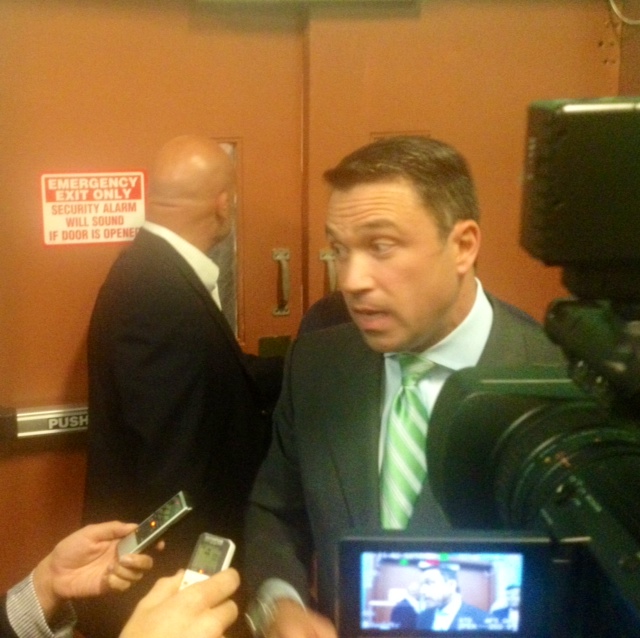





 Zuniga (photo: Shen Qiu)
Zuniga (photo: Shen Qiu) Fuentes-Berain (photo: Shen Qiu)
Fuentes-Berain (photo: Shen Qiu)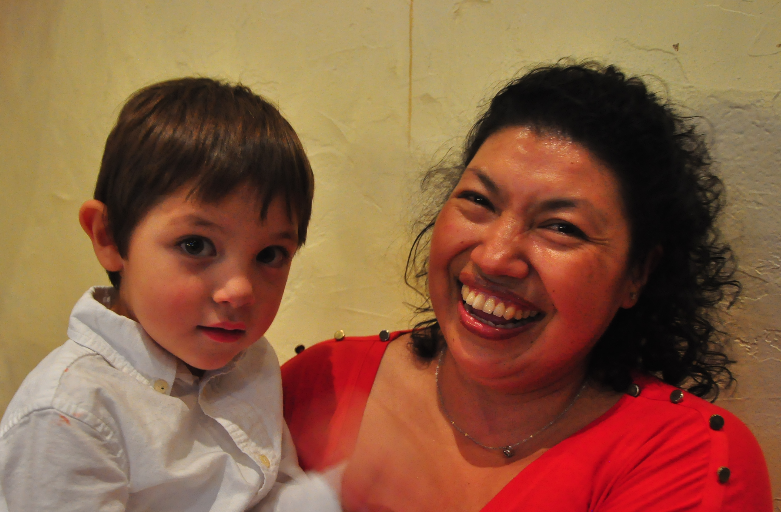 Madrigal and her son (photo: Shen Qiu)
Madrigal and her son (photo: Shen Qiu)